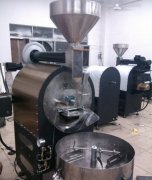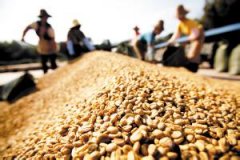What are the "chemical" ingredients in a cup of coffee?

"the taste is delicious", "Didi is fragrant, but the meaning is not enough"-from the advertising words of coffee, we can see that flavor is the soul of coffee. Recently, "Coffee Flavor Chemistry", co-written by Dr. Zeng Fankui of Lanzhou Institute of Chemical Physics of Chinese Academy of Sciences and Professor ou Shiyi of Food Department of Jinan University, was published by Jinan University Publishing House. This is the first academic monograph on coffee processing in China.
Holding a handful of coffee beans in his hand, Zeng Fankui said: "Raw coffee beans basically do not smell fragrance, and the flavor substances in coffee are mainly produced through the thermal reaction of the roasting process." The process of roasting is the process of chemical changes in coffee beans-sucrose, chlorogenic acid, protein, trigonelline, fat and other components will form the flavor of coffee through maillard reaction and strecker degradation reaction. The origin, roasting degree and brewing mode of coffee will affect the flavor of coffee.
Coffee flavor chemistry has been studied for more than 200 years. Researchers have been committed to the separation and identification of coffee flavor substances. At present, more than 1000 coffee flavor substances have been reported. People can smell the aroma of coffee, because of the volatility of chemical molecules, the flavor of these chemical molecules is combined to form the taste of coffee. A doctor from the Swiss Federal Institute of Technology once said in his graduation thesis: "people like coffee not because it has good nutritional value or health care function, but because it has a little exciting effect." its flavor is also unique.
Recent studies in the United States, Japan and Finland have shown that drinking coffee can reduce the incidence of depression. However, Zeng Fankui said that at present, instant coffee sold in the domestic market generally contains plant fat powder, which is allowed to be used as a food raw material containing trans fatty acids, so it is best to drink freshly ground coffee and brew with condensed milk (fresh milk and sugar is also fine). Coffee partners also try not to use it, there is the same problem.
In the book Coffee Flavor Chemistry, the author describes in detail the research history, development status, research methods and formation mechanism of coffee flavor, and introduces the flavor characteristics of special varieties of coffee, such as Blue Mountain Coffee, Special roasting Coffee, Kopi Luwak and so on. At the same time, the analytical method of distinguishing Arabica coffee mixed with Roberta coffee by high performance liquid chromatography was introduced in detail.
When it comes to the original intention of writing this book, I would like to start with a story six years ago when Zeng Fankui was a PhD student: "at that time, I saw that the teacher wanted to entertain a German friend with freshly brewed coffee. He put the crushed coffee powder in the cup and made a cup of coffee like tea. Because the dregs were not separated, the foreign friend stood by the sink and took a sip of coffee and spit out dregs. The scene was quite awkward at that time. " Zeng Fankui said that only after that did he want to really understand coffee.
Since then, Zeng Fankui began to study the knowledge and a series of processes in the process of coffee processing, from picking coffee from the fields to peeling, degumming, shelling, roasting, and so on. He also helped Hainan farmers set up coffee estates and spread coffee processing knowledge and coffee culture. He learned that many people in China know little about coffee. They think that drinking coffee is a petty bourgeoisie, and they care more about the experience of drinking coffee than drinking coffee. At present, most of the domestic coffee books are about daily life, mainly about the origin of global coffee, brewing coffee utensils and how to make coffee.
Zeng Fankui was really asked to write a professional book on coffee flavor because in 2011 he read such a passage in a foreign book, the Handbook of Coffee appreciation: it is said that China also produces coffee, but the origin and output are not clear. "Let foreigners know about Chinese coffee, let Chinese people know about our own coffee, and stimulate people's interest in coffee." With such an idea, Zeng Fankui combined with his own research, referred to a large number of foreign coffee papers, journal papers, patents and so on to write such a book.
Important Notice :
前街咖啡 FrontStreet Coffee has moved to new addredd:
FrontStreet Coffee Address: 315,Donghua East Road,GuangZhou
Tel:020 38364473
- Prev

The fourth part of the history of coffee-the commercialization of coffee
For many coffee lovers, the period from the mid-19th century to the end of the 20th century was the dark age of coffee. In this day and age, coffee has lost the mysterious charm of the Middle East, become commercialized, and frankly become ordinary. When coffee was first introduced to England in the 17th century, it was enjoyed by all sectors of society. But the rich will enjoy it in their social clubs.
- Next

The difference between "washing" and "Solar" Coffee beans
When you buy coffee beans, you can always hear words such as washing in the sun, half-washing in the sun, half-day honey treatment and so on. Let's talk today about the difference between washing and sun-drying beans. What effect does it have on the flavor of coffee beans? The coffee beans after harvest must enter the treatment program immediately, otherwise they will begin to ferment, making the coffee beans have a bad smell. The method of treatment is the method of sunlight.
Related
- Detailed explanation of Jadeite planting Land in Panamanian Jadeite Manor introduction to the grading system of Jadeite competitive bidding, Red bid, Green bid and Rose Summer
- Story of Coffee planting in Brenka region of Costa Rica Stonehenge Manor anaerobic heavy honey treatment of flavor mouth
- What's on the barrel of Blue Mountain Coffee beans?
- Can American coffee also pull flowers? How to use hot American style to pull out a good-looking pattern?
- Can you make a cold extract with coffee beans? What is the right proportion for cold-extracted coffee formula?
- Indonesian PWN Gold Mandrine Coffee Origin Features Flavor How to Chong? Mandolin coffee is American.
- A brief introduction to the flavor characteristics of Brazilian yellow bourbon coffee beans
- What is the effect of different water quality on the flavor of cold-extracted coffee? What kind of water is best for brewing coffee?
- Why do you think of Rose Summer whenever you mention Panamanian coffee?
- Introduction to the characteristics of authentic blue mountain coffee bean producing areas? What is the CIB Coffee Authority in Jamaica?

